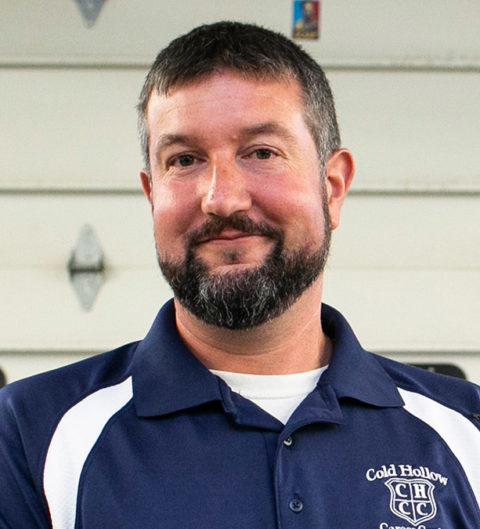“Having former students gainfully employed, owning businesses, paying taxes and living in the same area they grew up in shows the enormous payback for the time they spent practicing their skills with me. Many of these graduates have ‘broken the cycle’ of living in poverty and are inspirations to their families.”
Baxter Weed never imagined he would be an automotive technology teacher in his hometown of Enosburg Falls, Vermont. A computer engineering major in college, Weed had always been on an exclusively “college prep” track and was unaware that career education was an option. It was his passion for all things mechanical that led him to transfer to an automotive program and take a job at a local independent shop.
At the shop, Weed caught the teaching bug, sharing his skills and building relationships with local high school students who helped the professional technicians. Seven years later, Weed became an automotive teacher at Cold Hollow Career Center, where he has taught for 18 years. He is an Automotive Service Excellence (ASE) Master Certified Technician and holds an associate degree in automotive technology and a bachelor’s degree in professional technical education, along with several other certifications.
Weed’s automotive program is aligned to national standards and industry requirements, and students can obtain postsecondary credits while still in high school through their courses. Cold Hollow’s auto program is one of the few in Vermont that is part of a formal ASE mentorship program, giving students the opportunity to job-shadow and receive co-operative job placements. Over the past seven years, half of Weed’s graduates have entered employment in automotive or a related field. Of students receiving a co-op placement, one in three receive full-time job offers upon graduation.
Beyond career preparation, Weed takes pride in sparking a passion in his students for cars—the same spirit that drew him to his trade. Each fall, Weed runs a “powersports” week, when his students work on snowmobiles, all-terrain vehicles, motorcycles and dirt bikes. His class also visits regional airport repair facilities, the largest car dealership in the state, farm equipment shops, trucking companies, muscle car shops, hydropower plants, technical colleges and even an auto show in Montreal—crucial in Weed’s small, rural community where training vehicles and engagement with a wide range of businesses are hard to come by. After school, Weed offers an automotive club for students to hone their fabrication, welding and performance skills on everything from a custom motorcycle to a lowered panel truck. Weed determines auto club projects based on student interest, letting their curiosity guide the work. Students also have the opportunity to request projects in class, suggest field trips and choose their own long-term advanced project.
“Leveling the playing field is one of the most important things to do for a good class environment. A normal mix of students in my auto program ranges from the top of the academic ladder to the bottom, but that all goes out the window because none of them are practiced and experts in the program itself when they start. This allows for different relationships to form, and the opportunity for students to show strengths that they’ve never had the chance to show.”
